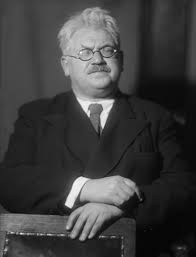Vasily Struve (historian) facts for kids
Vasily Vasilievich Struve (born February 2, 1889, died September 15, 1965) was a famous Soviet historian. He was an expert in "oriental studies," which means he studied the history and cultures of the East, especially the Ancient Near East. He started a new way of studying ancient history in the Soviet Union.
Contents
Early Life and Education
Vasily Struve was born in Saint Petersburg, Russian Empire. In 1907, he began studying history at Saint Petersburg State University. There, he learned Ancient Greek and Latin. He also studied the Egyptian language with a famous Russian expert named Boris Turaev.
Mastering Ancient Languages
Struve became very good at reading all kinds of ancient Egyptian writing. This included a simpler form called Demotic. After graduating in 1911, he continued his research and taught at the university. In 1913, he went to Germany to learn even more about the Egyptian language.
Name Change and Return
During World War I, he changed his name from Wilhelm Wilhelminovich Struve to Vasily Vasilievich Struve. He returned to Russia and became a university lecturer in 1916. By 1920, he was a professor. From 1918 to 1933, he led the Egyptian art and culture department at the Hermitage Museum.
Expanding His Knowledge
While teaching, Struve also started learning other ancient languages. He studied Akkadian language, Biblical Hebrew, and other Semitic languages. He learned these from another expert, Pavel Kokovtsov. Struve also taught himself the Sumerian language.
Career and Major Works
In 1928, Struve earned his Master's Degree in history. His important paper was called Manetho and His Time. Later, he received a special Doctor of Science degree. In 1935, he became a full member of the USSR Academy of Sciences. This meant he was a top academician.
Leading Research Institutes
Struve held several important leadership roles. From 1937 to 1940, he was the head of the USSR Academy of Sciences Ethnography Institute. From 1941 to 1950, he led the Academy's Institute of Oriental Studies. Later, in 1959, he became the head of the Ancient East department at that same institute.
New Ways of Studying History
Struve was a pioneer in how history was studied. He moved away from older ways of thinking. Instead, he used a Marxist approach. This meant he looked closely at how social and economic structures changed over time. His ideas brought big changes to historical research.
Key Contributions to History
Vasily Struve wrote about 400 scientific works during his life. He worked with Boris Turaev on the Moscow Mathematical Papyrus. They published its translation in 1930. As an Egyptologist, he translated and published many Demotic documents from museums in the USSR.
Beyond Egyptology
Struve's research was not only about Egypt. He also wrote major scientific works on the history and art of Sumer, Babylonia, Assyria, and the Hittite Empire. These were all important civilizations of the Ancient Near East.
Important Publications
He wrote many research papers and textbooks in these areas. One of his most important works was "History of the Ancient East" (1941). Struve also led a large team that worked to publish all the Greek writings from the ancient Bosporan Kingdom. He also published a book on the history of the ancient Northern Black Sea Coast, Caucasus, and Middle Asian civilizations.
See also
 In Spanish: Vasili Struve para niños
In Spanish: Vasili Struve para niños


